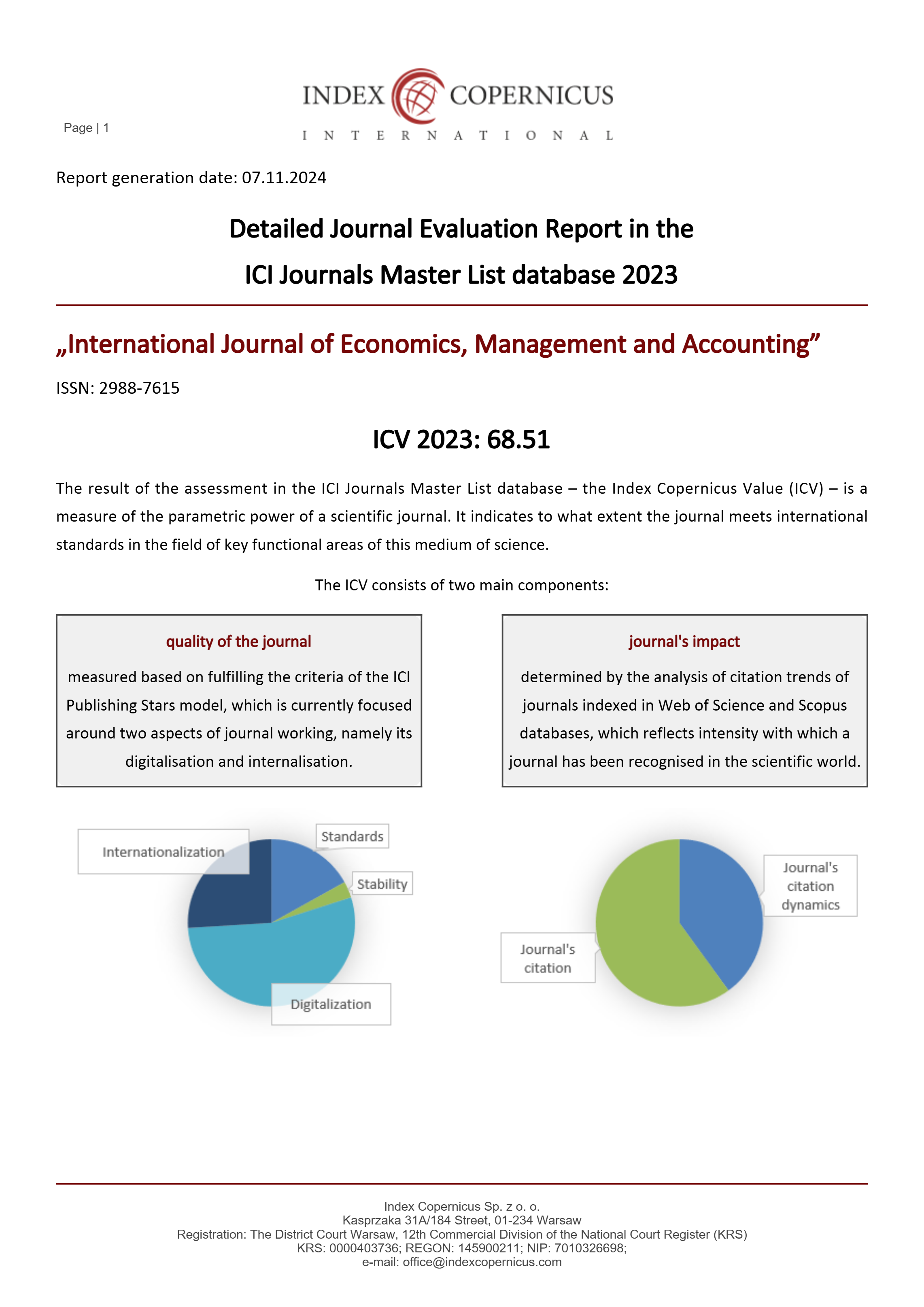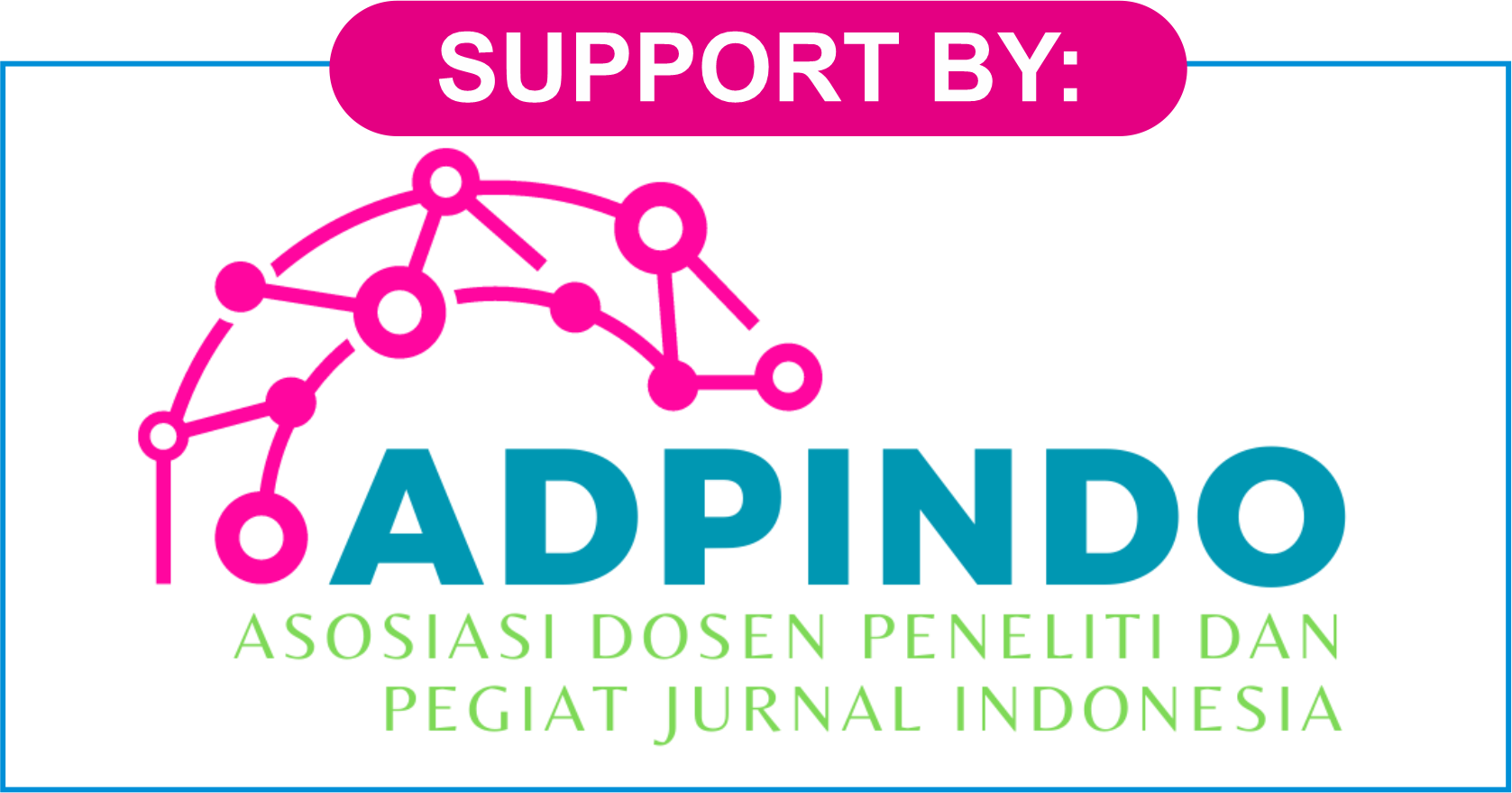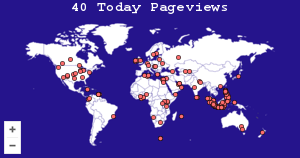The Effect of Audit Complexity, Time Budget Pressure and Work Pressure on Dysfunctional Audit Behavior with Locus of Control as Moderation
DOI:
https://doi.org/10.47353/ijema.v2i10.250Keywords:
Audit Complexity, Time Budget Pressure and Job Pressure, Locus of Control, Dysfunctional Audit BehaviorAbstract
This study examines the role of locus of control as a moderating variable in the relationship between audit complexity, time budget pressure, and job stress on auditor dysfunctional behavior. Dysfunctional behavior in the context of auditing refers to actions that can damage the integrity and quality of audit results, such as delays in work, non-objective decision making, or neglect of proper audit procedures. Auditors often face challenges in the form of high task complexity, tight deadlines, and high job stress. The sample used was auditors working at a Public Accounting Firm in the Jakarta area. The sample of this study consisted of 125 respondents. Primary data analysis was carried out using the Structural Equation Modeling (SEM) method. The results of this study indicate that the time budget pressure variable has the greatest direct influence on auditor dysfunctional behavior. Then locus of control has the greatest direct influence on the relationship between audit complexity and auditor dysfunctional behavior. This study contributes to public accounting firm employees in maintaining and improving their audit quality, somewhat avoiding auditor dysfunctional behavior, which can be seen from several factors, namely prioritizing larger teams with stricter levels of supervision, so that auditors have an incentive to comply with proper audit procedures rather than taking dysfunctional actions. Then face the pressure to develop better individual skills. For further research, researchers plan to expand the research area and look for objects in other fields.
Downloads
References
Achyarsyah, P., & Sabilah, N. S. (2024). The Complexity of the Audit, Time Budget Pressure, Job Stress, and Dysfunctional Audit Behavior. Review of Integrative Business and Economics Research, 13(3), 201–216.
Adeoti, M. O., Shamsudin, F. M., & Mohammad, A. H. M. (2020). Opportunity, job pressure and deviant workplace behaviour: does neutralisation mediate the relationship? A study of faculty members in public universities in Nigeria. European Journal of Management and Business Economics, 30(2), 170–190. https://doi.org/10.1108/EJMBE-08-2017-0002
Al Shbail, M., Salleh, Z., & Mohd Nor, M. N. (2018). Antecedents of burnout and its relationship to internal audit quality. Business and Economic Horizons, 14(4), 789–817. https://doi.org/10.15208/beh.2018.55
Anggraini, E. M., & Nafasati, F. (2018). Pengaruh tekanan pekerjaan terhadap perilaku disfungsional audit dengan the big five personality dan locus of control sebagai variabel moderasi. Majalah Ilmiah Solusi, 16(2), 177–203.
Azizah, N. D. J., & Pratono, R. (2020). Pengaruh Locus Of Control, Independensi, Kompleksitas Tugas, Dan Gender Terhadap Audit Judgement (Studi Empiris Pada Kantor Akuntan Publik di Surabaya). Liability, 2(1), 106–126. https://journal.uwks.ac.id/index.php/liability/article/view/881
Badollahi, I., Arman, A., Salam, A., & Razak, L. A. (2020). Time Budget Pressure, Kompleksitas Audit Dan Kualitas Audit. Balance: Economic, Business, Management and Accounting Journal, 17(2), 65. https://doi.org/10.30651/blc.v17i2.5269
Dewayanti, D. A. M., Dewi, N. P. S., & Rustiarini, N. W. (2022). Pengaruh Kepemimpinan Autentik, Nilai Etika Perusahaan, Tekanan Anggaran Waktu, dan Kompleksitas Tugas terhadap Perilaku Disfungsional Auditor pada Kantor Akuntan Publik di Provinsi Bali. Jurnal Kharisma, 4(1), 363–375.
Dewi, I. G. A. R. P., & Jayanti, L. G. P. S. E. (2021). Pengaruh Tekanan Anggaran Waktu Pada Stress Kerja Dan Dampaknya Terhadap Perilaku Reduksi Kualitas Audit. KRISNA: Kumpulan Riset Akuntansi, 13(1), 25–30. https://doi.org/10.22225/kr.13.1.2021.25-30
Febriyani, R. A., Maidani, M., & Eprianto, I. (2024). Pengaruh Integritas, Beban Kerja, Dan Tekanan Anggaran Waktu Auditor Terhadap Kualitas Audit (Studi Empiris Pada Kantor Akuntan Publik Di Wilayah Kota Bekasi Dan Dki Jakarta). SENTRI: Jurnal Riset Ilmiah, 3(3), 1560–1570. https://doi.org/10.55681/sentri.v3i3.2433
Hair Jr, J., Hair Jr, J. F., Hult, G. T. M., Ringle, C. M., & Sarstedt, M. (2021). A primer on partial least squares structural equation modeling (PLS-SEM). Sage publications.
Hartanto, O. (2018). Pengaruh Locus of Control, Tekanan Anggaran Waktu Komitmen Profesional, Terhadap Perilaku Disfungsional Auditor. EKUITAS (Jurnal Ekonomi Dan Keuangan), 20(4), 473–490. https://doi.org/10.24034/j25485024.y2016.v20.i4.59
Inoue, A., Eguchi, H., Kachi, Y., & Tsutsumi, A. (2023). Perceived psychosocial safety climate, psychological distress, and work engagement in Japanese employees: A cross-sectional mediation analysis of job demands and job resources. Journal of Occupational Health, 65(1), 1–13. https://doi.org/10.1002/1348-9585.12405
Kartana, I. W. (2021). Pengaruh Locus of Control Dan Kompleksitas Tugas Dengan Sifat Machiavellian Sebagai Pemoderasi Terhadap Perilaku Disfungsional Audit Di Kap Kota Denpasar. Akuntansi Dan Teknologi Informasi, 14(2), 17–31. https://doi.org/10.24123/jati.v14i2.4663
Khairunisa Santoso, & Barlia Annis Syahzuni. (2024). Dinamika Earnings Management: Implikasi Dari KualitasAudit, Komite Audit, Dewan Komisaris, Dan KepemilikanInstitusional. Jurnal Akuntansi Dan Bisnis Krisnadwipayana, 11(c), 41–55.
Khalil, S., & Nehme, R. (2023). Performance evaluations and junior auditors’ attitude to audit behavior: a gender and culture comparative study. Meditari Accountancy Research, 31(2), 239–257. https://doi.org/10.1108/MEDAR-04-2021-1285
Kirbaş, Z. Ö., Bayraktar, B., & Aktaş, E. O. (2024). Salivary apelin hormone response and dysfunctional attitudes in adolescents in Türkiye: a relational screening model. BMC Psychology, 12(1), 1–8. https://doi.org/10.1186/s40359-024-01551-w
Lestari, N. L. P. R. W. (2019). Locus of Control dan Time Pressure sebagai Variabel Pemoderasi Hubungan Stres Kerja Auditor pada Perilaku Disfungsional Audit. JEMA : Journal of Economic, Management and Accounting, 1(1).
Lestariwati, N. R., Maslichah, & Sudaryanti, D. (2020). Pengaruh Kompleksitas Audit, Tekanan Anggaran Waktu Dan Pengalaman Auditor Terhadap Kualitas Hasil Audit. E-Jra, 09(02), 53–72.
Lukman, H. (2017). Interactions between personal characteristics and audit behavior: A moderating role of organizational commitment. International Journal of Economic Perspectives, 11(3), 337–345.
Masoom, M. R. (2024). Toward a Model of Sense of Control: Evidence from Salaried Employees Working in the Private Sector of Bangladesh. International Journal of Interdisciplinary Organizational Studies, 19(1), 87–121. https://doi.org/10.18848/2324-7649/CGP/v19i01/87-121
Moustafa Abdallah, B. A., Ghanem, M. G., & Hijazi, W. H. (2024). Analyzing the Factors That Affect Auditor’s Judgment and Decision Making in Lebanese Audit Firms. Journal of Risk and Financial Management, 17(2). https://doi.org/10.3390/jrfm17020073
Munidewi, I. A. B., Ludigdo, U., Djamhuri, A., & Andayani, W. (2024). Role of Affective Neuroscience in Audit Judgement and Decisions Making: A Systematic Literature Review for Auditing Research. Australasian Accounting, Business and Finance Journal, 18(1), 130–147. https://doi.org/10.14453/aabfj.v18i1.08
Octavia, M., & Susilo, G. F. A. (2022). Kompetensi, Motivasi, Tekanan Anggaran Waktu, Dan Kompleksitas Tugas Terhadap Kualitas Audit Inspektorat Oleh. Braz Dent J., 33(1), 1–12.
Prinanda, B., & Kuntadi, C. (2024). Pengaruh Keterampilan, Objektivitas Auditor, Dan Tingkat Kompleksitas Auditor Terhadap Kualitas Audit. Jurnal Media Akademik (JMA), 2(5).
Ramadani Rachmah, A., Sudiro, A., & Amanah Jiwa Juwita, H. (2022). The effect of transformational leadership on organizational commitment: Mediating role of job stress and job satisfaction. International Journal of Research in Business and Social Science (2147- 4478), 11(8), 102–112. https://doi.org/10.20525/ijrbs.v11i8.2134
Riyadi, S. (2019). the Influence of Job Satisfaction, Work Environment, Individual Characteristics and Compensation Toward Job Stress and Employee Performance. International Review of Management and Marketing, 9(3), 93–99. https://doi.org/10.32479/irmm.6920
Rohman, A. (2018). Pengaruh Kompleksitas Tugas, Tekanan Anggaran Waktu, dan Independensi Auditor Terhadap Perilaku Disfungsional Audit dan Implikasinya Pada Kualitas Audit. Jurnal Riset Akuntansi Tirtayasa, 03(02), 241–256.
Rohmanullah, I., Yazid, H., & Hanifah, I. A. (2020). Pengaruh Stres Kerja, Kompetensi, Independensi Dan Profesionalisme Terhadap Kualitas Audit Pada Inspektorat Provinsi Banten. Jurnal Riset Akuntansi Tirtayasa, 5(1), 39–56. https://doi.org/10.48181/jratirtayasa.v5i1.8283
Rustiarini, N. W. (2014). Sifat Kepribadian dan Locus of Control Sebagai Pemoderasi Hubungan Stres Kerja dan Prilaku Disfungsional Audit. Simposium Nasional Akuntansi XVI, 11(Juni 2014), 1–19.
Sipayung, E. S. N., Zahara, D. E., & Noor, I. N. (2021). Fenomena Disfungsional Audit. Media Riset Akuntansi, Auditing & Informasi, 21(2), 191–206. https://doi.org/10.25105/mraai.v21i2.9401
Sugeng Wiyantoro, L., Yan, C., & Yuanyuan, L. (2023). Evaluating the performance of external auditor during COVID-19: The case of dysfunctional audit behaviour in Indonesia. Cogent Business and Management, 10(2), 1–59. https://doi.org/10.1080/23311975.2023.2246744
Sukma, F. F., Aspahani, A., & Kalsum, U. (2021). Pengaruh Time Budget Pressure, Risiko Kesalahan dan Kompleksitas Audit terhadap Kualitas Audit (Studi Empiris di Kap Sumbagsel). 5(1), 1–27. https://repository.unsri.ac.id/44045/
Syamsuri, S. (2023). Dampak Kompleksitas Audit, Fee Audit Dan Pengalaman Kerja Terhadap Kualitas Audit. Jurnal Ilmiah Manajemen, Ekonomi, & Akuntansi (MEA), 7(1), 351–367. https://doi.org/10.31955/mea.v7i1.2938
Tjan, J. S., Sukoharsono, E. G., Rahman, A. F., & Subekti, I. (2019). An analysis of the factors which influence dysfunctional auditor behavior. Problems and Perspectives in Management, 17(1), 257–267. https://doi.org/10.21511/ppm.17(1).2019.22
Ulandarai, A. U., & Kuntadi, C. (2024). Faktor-Faktor yang Mempengaruhi Kualitas Audit: Pengaruh Kompleksitas Audit, Tekanan Anggaran Waktu dan Pengalaman Auditor. Jurnal Manajemen Dan Akuntansi, 1(3), 151–161. https://doi.org/10.62017/wanargi
Umar, M., Sitorus, S. M., Surya, R. L., Shauki, E. R., & Diyanti, V. (2017). Pressure, dysfunctional behavior, fraud detection and role of information technology in the audit process. Australasian Accounting, Business and Finance Journal, 11(4), 102–115. https://doi.org/10.14453/aabfj.v11i4.8
Wardani, I. A. M. S., Padnyawati, K. D., & Hutnaleontina, P. N. (2021). Pengaruh Tekanan Anggaran Waktu, Kompleksitas Tugas, Dan Karakteristik Personal Terhadap Perilaku Disfungsional Audit Pada Kantor Akuntan Publik Di Kota Denpasar. Hita Akuntansi Dan Keuangan, 2(2), 281–296. https://doi.org/10.32795/hak.v2i2.1544
Wayan Ayu Puspita, N., Wayan Rustiarini, N., Putu Shinta Dewi, N., & Ekonomi dan Bisnis Universitas Mahasaraswati Denpasar, F. (2023). Stres Kerja, Gaya Kepemimpinan dan Perilaku Disfungsional Audit: Tekanan Anggaran Waktu sebagai Pemoderasi. Kumpulan Hasil Riset Mahasiswa Akuntansi (Kharisma), 5(Juni), 385–402.
Wetmiller, R. J. (2022). The copycat effect: do social influences allow peer team members’ dysfunctional audit behaviors to spread throughout the audit team? Journal of Applied Accounting Research, 23(2), 362–380. https://doi.org/10.1108/JAAR-12-2020-0232
Widhiaswari, D. A. S., Wianto Putra, I. M., & Damayanti, N. N. S. R. (2021). Pengaruh Tekanan Anggaran Waktu, Locus of Control, Kompleksitas Tugas dan Turnover Intention Terhadap Perilaku Disfungsional Auditor Pada Kantor Akuntan Publik di Provinsi Bali. Jurnal Riset Akuntansi Warmadewa, 2(1), 54–59. https://doi.org/10.22225/jraw.2.1.2934.54-59
Widia, W., & Handayani, P. (2024). Pengaruh Profesionalisme, Etika Profesi Audit Dan Kompleksitas Tugas Terhadap Perilaku Disfungsional Audit. 449(11), 449–454. http://jurnal.kolibi.org/index.php/neraca
Yulianti, Chandrarin, G., & Supanto, F. (2022). Effect of ethics and professionalism on audit quality: A moderating role of dysfunctional audit behavior. Problems and Perspectives in Management, 20(3), 529–539. https://doi.org/10.21511/ppm.20(3).2022.42
Zacharias, T., & Laurens, S. (2024). Kinerja Pegawai: Interaksi Konsep Diri Dan Lokus Kendali. 6(08).
Zamzam, I., Mahdi, S. A. R., & Sardju, F. (2024). The Influence of Competency and Professional Behavior on Internal Auditor Performance in the Digital Era with Time Budget Pressure as a Moderator. Australasian Accounting, Business and Finance Journal, 18(2), 120–132. https://doi.org/10.14453/aabfj.v18i2.08
Downloads
Published
How to Cite
Issue
Section
License
Copyright (c) 2025 Siti, Barlia Annis Syahzuni

This work is licensed under a Creative Commons Attribution 4.0 International License.











